The Master of Philosophy (M.Phil.) is an advanced research programme, considered an intermediate degree between post-graduate and doctorate, and is a qualification in its own right. This programme is available to any qualified applicants with competencies and readiness to engage in research for involvement in Christian ministry and theological education.
The aim of the Master of Philosophy (M.Phil.) is to provide a pathway for possible further learning and research at an advanced level. The candidate will have gained specialized knowledge of a particular discipline as a basis for more detailed research. It requires having developed independent research skills appropriate for an academic post or a career in advanced research and writing a thesis. The programme also seeks to develop servant leaders by imparting advanced knowledge, skills, and values through creative methods of research. It is designed with the philosophy ‘To equip for every good work’ (2 Timothy 3:7) with proficiency in a specific area of research as well as focus on the African context.

Students who successfully complete the Master of Philosophy in Theology programme will be able to:
An applicant must have the ability to pursue independent research with the option of choosing an area of research in any of the following: Biblical Studies (Old Testament/New Testament)/African-Christian Theology/ Missiology/ Christian Ministry/ Counselling. The candidate must pass all courses and submit a thesis. The candidate must obtain a total of 60 credits, consisting of four core courses, two from the area of specialization, two seminars, and writing a thesis as described below:
| Core Courses | Area of specialization | Seminar I, II & III | Thesis | |
|---|---|---|---|---|
| 16 Credits | 8 Credits | 6 Credits | 30 Credits | Total 60 Credits |
Courses Taught in Modular form
Full-Time: Two year
Part-Time: Four years